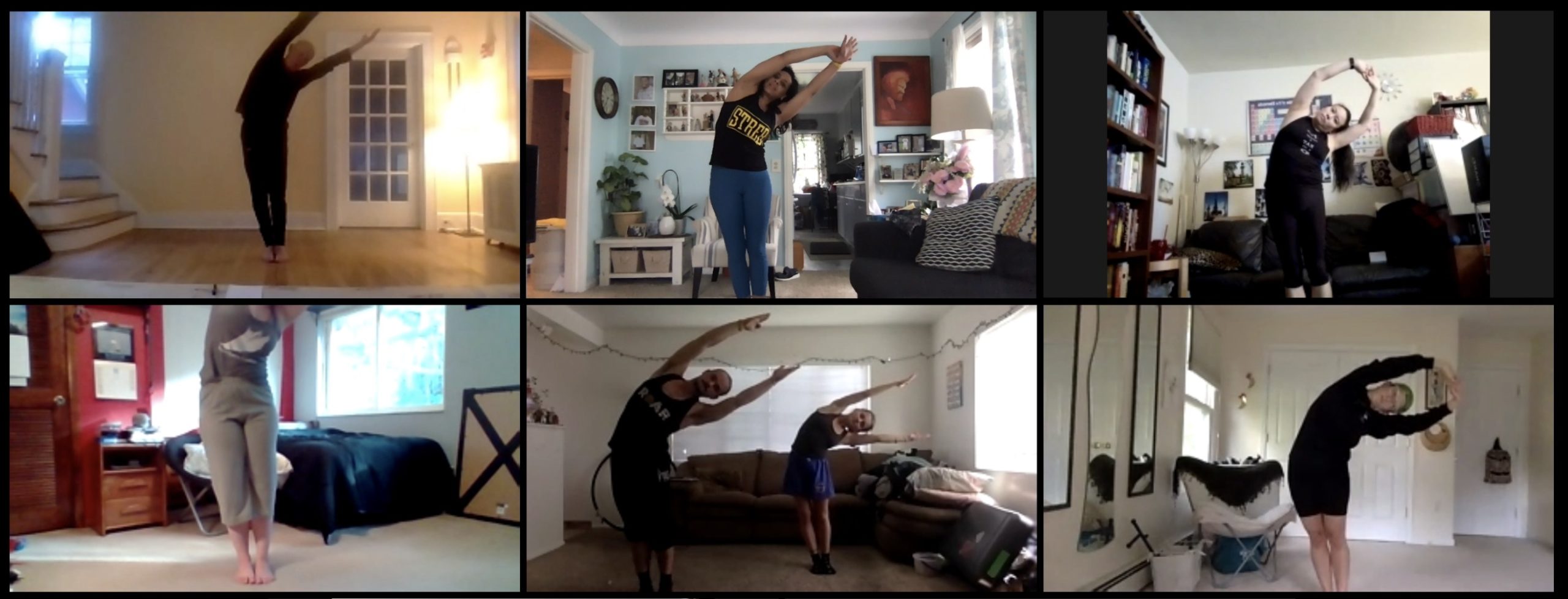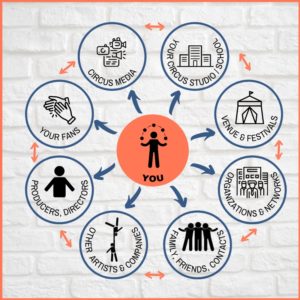Network Your Way Out of Isolation & Build Your Brand
In 2020, the practice of networking was elevated in the performing arts world, as countless creators turned towards the digital realm for solace, connection and industry building–not to mention for survival. After 11 months of near-isolation in the wake of the shutdown of live performance, some organizations and individuals have come away with stronger and deeper connections to their work, while others have drifted into bankruptcy or sought other fields of employment out of necessity. While the necessity of those changes is often related directly to each region and culture (depending on government or institutional support for example), there are some networking principles and practical steps that could be helpful to those companies and individuals who intend to remain in the circus industry. (Main Image: Courtesy of Social Ninja.)
Weigh In & Influence in Your Area of Expertise
In the article called “The Art of Networking” in Forbes, author Soulaima Gourani advocates for starting with the big picture and then filling in the details, stating “To figure out who you need to know, you must first determine where you are attempting to go. This process is calledstrategic networking. The alternative is unstructured networking that will never produce great results. When you begin to reach out to people to build your network, ask yourself what yourmissionis in your career and what yourmotiveis to build that specific relationship.” By identifying your networking mission, you gain the benefits of strategic growth and also the indirect perks expereinced through connection with peers.
Through all the turmoil and political strife that occurred in 2020, some in the performing arts world have used the opportunity to weigh in on where they stand as key players and to understand how their role can be impactful in the industry–clarifying their mission. Perhaps counterintuitively, the unexpected amount of downtime gave creators time to focus inward, act locally and simultaneously expand their personal networks while examining their practices. This has led to some practical online discussion and action groups forming around the world in regard to the circus sector, and some existing organizations have broadened their mandate in order to reach more people and to offer possibilities to make a change or have an influence on international circus happenings.
Circostrada
Circostrada (the European network for circus and street arts) is launching one of their big collaborative projects that offer participants an opportunity to reimagine international touring due to changes in the political and pandemic climate, not to mention the actual climate change incentive. The scheme, called Perform Europe, is open to Circostrada members and “is an international event that reimagines international touring by experimenting with sustainable ways (physical and digital) to design support. The 18-month long project will test ideas through proposals and discussions.” The opening event is on January 28th at 14:00 CET
MICC
The MICC (International Market of Contemporary Circus) has been offering monthly working group meetings since the beginning of the pandemic as a way to keep industry players engaged with one another. Interest group topics include: Presenting to Young Audiences, Agents and Directors in North America, International, Small to Medium-sized Circus Companies, Focus on Asia, Australia, Oceana, Focus on Latin America, Focus on Africa, and Circus and Climate.
Director Ruth Wikler says that before the pandemic the four-day annual gathering for circus professionals was meant to compliment theannual Montréal Complètement Cirquefestival. The staff saw the need early to shift things online, because it “permitted us to ensure that the dialogues launched at the four-day (online) event in July 2020 continue throughout the year. 14 peer-led working groups…meet regularly to advance our sector, kindle and maintain professional relationships, and foster international connections while traveling is impossible.”
Wikler points out that the groups are not meant as socializing tools, “While the working groups have had the effect of building and maintaining relationships, in general, they have not functioned as support groups. Rather, they have been doing two things: getting real work done in the virtual space, during a period in which getting real work done in the live space too often constitutes an exercise in frustration; and exchanging expertise across roles and geographies, creating an inspiring forum.” Wikler also assured me that “The MICC online is still open to join- register now and be part of this movement!”
.
Expand Your Circle
Circus and Its Others
Online conferences and seminars are a clear way to expand your knowledge of people’s roles in the sector, and also to broaden the role you play by strengthening connections over a common interest or cause.
When Circus And Its Others ran its first digital panel in November of 2020, it was a much paired down version of the in-person conference/festival Charles Batson and team (Karen Fricker, Ante Ursic, Olga Sorzano and Veronika Stefanova) had originally scheduled at the University of California, Davis. Although they were, fortunately, able to postpone the full conference and festival lineup to the following November of 2021, they knew the importance of keeping connected in the meantime to his constituency. So they set up a panel talk titled “Color in Center Ring: Cultivating Inclusivity in Circus” whic occurred on November 14, 2020. It would be paired with a series of continual events leading up to the main event in the summer of 2021, with the second scheduled to take placeSaturday, January 16, 2021, featuring participants across 11 time zones. It is titled “CIRCUS 2021: Adaptations and Possibilities”. This global workshop will provide artists and scholars from all over the world a chance to reflect on the challenges imposed by COVID-19 within the circus world.
Batson says CaiO offers live and unrecorded workshops in order to encourage real engagement between participants. Regarding the first workshop in November Batson says, “As a team, we felt that it was vital to have persons of color speaking of their experiences within contemporary circus worlds. Their testimonies, with their expressions of challenges as well as hopes and dreams, were bracing and inspiring. We look forward to more digital panels as well as to gathering together in person to continue these conversations.”
Cirkus Syd Circus Thinkers & Circus Speakers
Cirkus Syd in Sweden has several enrichment programs that offer opportunities for circus artists and makers from many nations to meet up and interact online. From circus movies, to discussion groups like Circus Thinkers and Circus Speakers to a healthy seminars and workshop shcedule, it is a good place to check in and get the pulse on international circus trends and and to share your own companies happenings.
Board chair Lina B. Frank of Cirkus Syd describes the surprising impact of new relationships she has formed through the online meetings, “I hadn’t anticipated that we’d get to know each other quite so welll via the Circus Thinkers Platform. I find it extraordinary that we have never met. I feel that I know and care for the individuals in the group and I had not realised that type of relationship could be achieved through exclusively online interaction.”
.
Push The Envelope
As opportunities to move and train have dwindled since the pandemic, depression and isolation have increased among artists that rely heavily on physical interaction in their work. The psychological benefitrs that trust-building, collaboration and teamwork offer to in person circus trainers and performers have been well-documented and are difficult to replicate online through discussion-based networking. Fortunately, wise studios and companies have carved out online training spaces in workshops to offer some continuation of training and collaboration among creators.
Projet LUMIÈRE Project
The Projet LUMIÈRE Project for example, began post pandemic to unite circus artists in their hour of need through online projects and information, stating that they aim to “Connect performing arts professionals to reduce feelings of isolation. Facilitate exchanges by sharing information among peers and industry professionals, and support and guide members of the community by providing access to resources and opportunities.”They do so by offering multiple events, including free online Pilates training and yoga training.

.
STREB
STREB’s Adult Remote Winter Repertory Intensive is another way to facilitate exchange by getting involved in a group project.Cassandre Joseph, Associate Artistic Director of STREB says this intensive “invites all bodies in all kinds of spaces to adapt solo work by choreographer Elizabeth Streb for a culminating live virtual performance. Camaraderie among our students is built on the conundrum of adapting one’s body to the work in the absence of Streb mats and one’s mind to the possibility that achievement can be had through any circumstance.”
In case you are wondering if the intensity level suits you, Joseph doesn’t mince words in her description of the action and the benefits of the program, stating “The dialogue of action ideas, development of alternative moves, and peer support and encouragement often generated during our classes inspire us in these times of separation and, at the very least, unite us all in one critical STREB experience, that taking the hit is still felt alike across virtual boundaries. “
.

Best Practices for Networking
1. Budget time for networking. It might be tempting to stick with the networks you know (school mates, fellow company members, and other companies you’ve worked with before), but there is wisdom to widening the scope of your network, especially in an industry that has such a culture of motion and travel involved. By considering networking part of your job it can become a mentally healthy pursuit of connection during a time when people are short on in-person professional interactions.
That can mean setting aside time each week to scan your online networks for social opportunities like workshops, panels or events, or touching base with old contacts you haven’t spoken to since the pandemic began to see what they are up to.
2. Be authentic and vulnerable (when appropriate) in presenting your work. Not only will this help people to understand that you are not simply all about selling your show, it will help them see you as a person/company with a purpose to communicate through their art. Bonus, you may connect with like-minded people and build a lasting friendship or two in the process.
3. Be prepared to listen and to help out colleagues. Building trust through connection is not about transactional scenarios, but more about letting your colleagues know that you too have a stake in their survival and success. In her article “Networking for Artists”, fine artist Kesha Bruce says, “The problem with the word ‘networking’ is that most artists think of it as a thing you do rather than a thing you create. When many artists hear the word ‘network’, they think of staged networking events, after-work cocktails hours, over enthusiastic handshakes, mindless small-talk, and collecting business cards.” Creating a network is more than making those superficial connections. Not everyone will reciprocate and have a stake in your work, but the ones that count to you are the ones who get what you do and who take an interest in reciprocating.
4. Have your pitch and related materials ready to share, but don’t think of it as the main task. With the slowing down of social life, came the slowing down of opportunities for all in our industry. Being flexible means being willing and prepared to connect and collaborate now given the restrictions you have, and in a best-case scenario (when travel bans are lifted for example). This allows you to continue to build your brand and to keep work opportunities wide open. This flexibility also makes you a more valuable and innovative prospective partner for others in your network. Business Insider claims up to 85% of all jobs are found through networking methods rather than direct applications.In an article in FORMAT magazine, the author states 95 percent of people consider a face-to-face meeting crucial for building long-term work relationships. In pandemic times when it isn’t as possible to get out of the studio and meet new people, a Zoom meeting, panel or workshop might be the only way you can make those connections currently.
5. Join organizations and networks that offer an opportunity to shape the circus sector.The organizations that have formerly provided in-person conferences, artist support and events have had to reinvent themselves this past year to remain relevant and to obtain funding. Nearly all of them are offering some version of online networking to their constituents. If you don’t see what you need in these groups you can contact them and suggest it, or better yet, create it–start your own action group while you have the time to focus on making your art form and the sector reflect what matters to you here and now.
.
By looking at networking not as a transactional exchange–but more as an opportunity to situate yourself in your artistic community, you will gain more than a performance gig next month, although that could happen too. You will also be building a reputation, finding your role in the field, figuring out who you might want to collaborate with and in the best cases, discovering other strengths you might have to offer the field. These are the perks to being a valued member of an international community.
CircusTalk has plans in 2021 to expand our networking reach and to offer networking and workshop events to PRO members throughout the year to help further strengthen our community! Feel free to reach out and suggest ideas and stay tuned.
CircusTalk offers the circus community another networking tool through our discussion groups where you can meet up with like-minded individuals with common interests in circus. Please join us there to discuss your favorite circus topic, and if you do not see the subject represented there, create the discussion group as moderator!
Other Active Networking Resources in the Arts En Piste Arts WellBeing Collective Circus Arts Hub...
Do you have a story to share? Submit your news story, article or press release.





